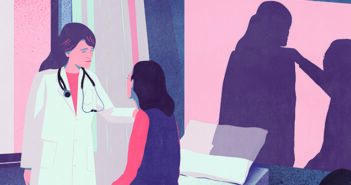Med students want to learn how the planet’s health impacts their patients’.
As humans destroy habitats and come into closer contact with animals, infectious diseases emerge. HIV is an infamous example; SARS-CoV-2 may have zoonotic origins too.
Closer to home, the destruction of forests and resultant patchwork of urban and natural landscapes enable blacklegged ticks to proliferate. Simultaneously, physicians see climbing cases of Lyme disease, says Senior Associate Dean of Biology for Curricular Affairs Katherine Smith, PhD.
Recognizing this critical overlap of environmental degradation and human health, medical students formed a Brown chapter of the Planetary Health Report Card, a student-driven initiative across numerous med schools in multiple countries. The report card assesses planetary health—the intersection between health and interactions with the environment—within the curriculum, research, community outreach and advocacy, student initiatives, and sustainability. The students are also part of the Planetary Health Task Force, which includes physicians and faculty. That group formed in 2020 to improve the Medical School’s commitment to planetary health after release of the inaugural report card.
“For too long, clinicians and physicians have been left out of the conversation about environmental change and impacts,” and focused on diagnostics and treatment instead of preventive care, says Smith, an assistant professor of medical science who is working with the task force. “The field of planetary health brings them into the toolshed more fully.”
“We are not just protecting what we think of as the environment, but we are also protecting other aspects of our day-to-day life,” Blaire Byg MD’24 says. She adds that physicians can use their “privilege” to “advocate for our patients and our patients’ health.”
On this year’s report card, Brown received a B-, ranking seventh out of the 26 participating med schools in North America, according to Allison Navarrete-Welton MD’24.
One of the School’s weakest scoring areas was the curriculum, Byg adds. Although planetary health is part of some preclinical lectures and workshops, there’s a noticeable absence of these topics in clinical education, Kanika Malani MD’24 says.
The task force wants to work with the administration to address this shortcoming, Byg says. This year they’re offering a new preclinical elective, Planetary Health: Global Environmental Change and Emerging Infectious Disease.
Differences in environments between communities can exacerbate health disparities, says Interim Associate Dean for Medical Education Sarita Warrier RES’08, MD, a member of the task force. “Being able to call out and make those connections when we talk about disparities, health equity, social justice, and environmental justice … is also a priority for the curriculum,” she says.
Another idea under discussion is teaching students in Doctoring how to ask patients about their exposure to environmental factors that may impact health, in order to provide more appropriate medical advice, Jane Chen ’20 MD’24 says. The team has considered creating a scholarly concentration on planetary health, adds Jamie Thorndike MD’24.
The students also hope to get funding for planetary health research, Malani says. Strengthened ties between the Medical School, the Institute at Brown for Environment and Society, and the School of Public Health is another goal, according to Chen.
Finally, alongside curricular development, the Planetary Health Task Force plans to boost community engagement by connecting with local organizations, Byg says.
The task force, Smith says, has been one “of the most purposefully driven student groups I’ve had the pleasure of working with.”
“Our students are, I think, the best advocates for their patients and their communities,” Warrier adds. “I think building [planetary health]into the curriculum will give them a stronger foundation to be even better advocates around this particular area.”
Chen says it’s critical the Medical School actively helps implement the changes the students want. The work “can’t stay with the students, even though it started there,” she says.



